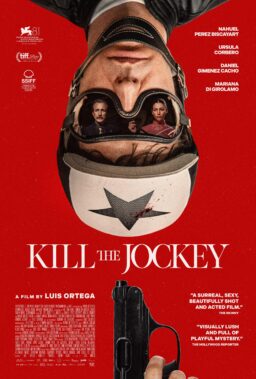Q. You aren’t a big fan of colorized movies, and I agree that the studios should leave the original movies alone. Black and white is beautiful, and is indeed more dreamlike. Colorization does mess with the lighting–but, in a way, can it help encourage people to see black and white films? Let me give you an example: my kids love Shirley Temple, although they’ve only seen the colorized versions on video. Since they’re kids they don’t like b&w now, but maybe when they’re older they’ll appreciate how grand b&w really is. Can it introduce older films to them by using elements they know, so later they can go back and experience it the way it was really meant to be seen? A lot of people don’t like b&w after all. (Dan Carell, Natick MA)
A. It’s that last bit that gets to me. Why don’t some people like b&w (and you’re right, they don’t)? How would I feel if I’d grown up in a world of color? I wonder if there’s a reader who came to b&w later and just plain loved it for its magical appeal?
Q. Regarding the recent question speculating that a breakup between Juno and Bleeker took place off-screen in “Juno“: Paulie Bleeker’s comment, “broke up with me!” isn’t referencing anything we haven’t seen. It’s clear there’s a difference of opinion between Juno and Bleeker regarding the status of their relationship. Recall the scene where he tells her “We could always get back together, too,” and she responds by asking “Were we together?” Juno views them as close friends that decided to have sex. She doesn’t think that necessarily makes them a couple, though Bleeker appears to. In that light, the scene where she tells him she’s pregnant and rides off saying “I’m sorry I had sex with you. I know it wasn’t your idea” can be construed as a breakup, at least from his point of view. (Greg Shaffer, Wichita, KS)
A. Sounds reasonable to me.
Q. My family and friends are discerning movie-goers (we like all genres; we’re down with the AFI 100). And we all, family and friends alike, thoroughly enjoyed “Speed Racer.” It was a bit cheesy but I loved it as an old SR cartoon fan. My kids (16, 19) never really saw SR but enjoyed it just as well. My 16-year-old is a “chick flick” teenage girl and she raved about it! What I’m asking is, why do critics pan such movies? Isn’t there a place for simple enjoyment and entertainment? Do you think that critiques of films may not always have the most useful criteria for judgment? (Jeff Young, Birmingham AL)
A. I haven’t seen the film, but I have liked (and disliked) similar films in the past. When I like one, I am always reminded of Pauline Kael’s insight: “The movies are so rarely great art, that if we cannot appreciate great trash, we should not go at all.”
Q. I’ll try to be brief. Are you ever offended simply by the content of a film? By violence, sexuality, language etc. Or is there another criteria that has caused you to be offended by a film? For example, I did not find the violence in “The Passion of The Christ” to be offensive, but I was appalled by the film “The Boondock Saints,” a much less violent film. Have you ever been faced with this question in your own career? (Lynwood Bradley, Cleveland GA)
A. I would prefer to say I am offended by bad movies but not by good ones, regardless of the content. But I know what you mean. I had a real wrestling match with myself while writing a review of “The Foot Fist Way,” which will appear June 6.
Q. In the webpage of “Ebert & Roeper At The Movies,” you have a
little snippet that pops up promoting the site, where Roeper exclaims “This movie just sucks!” and your response is “How can your heart be so cold?” I’ve been curious – what movie are you talking about? (John Fisch, Houston TX)
A. It’s supposed to be symbolic of the give-and-take on the show, and doesn’t refer to any single movie. Richard said, “This movie just sucks” in his review of the Lindsay Lohan movie “Just My Luck.” And I said “How can your heart be so cold?,” in our review of the Anthony Hopkins movie “The World's Fastest Indian.”
Q. It has been observed many times that when Hollywood runs out of ideas, it remakes an older film. I was stunned to read that Nicolas Cage was going to star in a remake of the “Bad Lieutenant.” It seems like only yesterday that I saw the original; 1992 doesn’t seem that long ago to me and I’m curious if you know what the shortest time between the release of a film and it’s remake is. Does this remake set any records for recycling movies? (Yuri Duncan, Indianapolis, IN)
A. I don’t know who holds the record, but I’m reminded that when Martin Scorsese was a guest on my TV show picking the ten best films of the 1990s, Abel Ferrara’s film was on his list.
Q. Finally saw “Juno,” loved it, thank you for the recommendation and all the further discussions on smart dialog, warm and understanding relationships and correct musical tastes. Now, regarding the comments of you and some of the readers on perfect casting (and I agree with all of your other examples, by the way, especially John Mahoney as the understanding dad in “Say Anything“), It’s a bit like the question of who’d win in a fight between Chigurgh and Plainview? Of course unless any movie is made again with different actors, there is no way of knowing if anybody else would be perfect for any given role (I recall your comments on “The Producers” and the recent musical version). In any case, I would be curious to see, for example, the unused footage in “Back to the Future” with Eric Stoltz in the Marty McFly role. Then I guess I could say, yeah, Michael J. Fox was the perfect choice. Ellen Page and her cast-mates make “Juno” rock and roll, and that’s what is on the screen. (Joel Meza, Mexicali, B.C., Mexico)
A. I realize that the notion of “ideal casting” is entirely theoretical. For all we know, if Ronald Reagan had played Rick in “Casablanca,” he might have been better than Bogart. But I doubt it.
Q. In reference to a reader’s observation of the lack of on-screen blemished youths, one actor comes to mind that bucks the dermatological trend: Freddie Cunliffe as the tortured teen Tom in Tim Roth’s excruciatingly powerful 1999 film “The War Zone.” Freddie’s appearance perfectly compliments his silently anguished performance. However, I cannot think of another film that allows the reality of adolescence to . . . break out. It’s a shame. (Andrew Baron, Houston, TX)
A. It is strange that acne, which afflicts so many teenagers, is all but invisible in the movies. I wonder it’s covered by makeup, or if they only cast actors with perfect skin.












